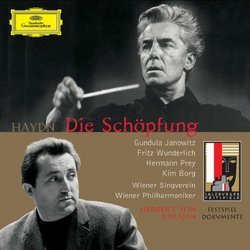| All Artists: Hermann Prey, Franz Joseph Haydn, Herbert von Karajan, Gerhard Steeger, Vienna Philharmonic Orchestra, Oskar Peter, Gundula Janowitz, Fritz Wunderlich Title: Joseph Haydn: Die Schöpfung Members Wishing: 0 Total Copies: 0 Label: Dg Imports Original Release Date: 1/1/2004 Re-Release Date: 11/8/2004 Album Type: Import Genre: Classical Styles: Opera & Classical Vocal, Historical Periods, Classical (c.1770-1830) Number of Discs: 2 SwapaCD Credits: 2 UPC: 028947495529 |
Search - Hermann Prey, Franz Joseph Haydn, Herbert von Karajan :: Joseph Haydn: Die Schöpfung
 | Hermann Prey, Franz Joseph Haydn, Herbert von Karajan Joseph Haydn: Die Schöpfung Genre: Classical
|
Larger Image |
CD Details |
CD ReviewsAn outstanding live performance, perhaps Karajan's best Santa Fe Listener | Santa Fe, NM USA | 10/09/2005 (5 out of 5 stars) "Since no one has compared this studio recording from 1966 (patchwork being added up to 1969) with Karajan's live performance from Salzburg the year before, I thought I'd fill in the gap. This review is posted twice, both here and under the live recording, also on DG.
Sound: Both sets re in excellent sound, although only the studio one is in stereo. The Austrian Radio transcript from Salzburg in 1965 is clear, warm, and detailed mono. The orchestra is set further back than in the studio version, but the soloists often sound closer. In both cases the chorus was the large Vienna Singverein , and their enunciation is muddied compared to smaller choirs. No preference in this regard between live and studio. I did find the original pressing of the studio version a bit too bright and less open than the live broadcast, but that may have been corrected in the new "Originals" reissue. Soloists: Gundula Janowitz is the ethereal soprano on both recordings and sings almost identically, although in the live recording she opens out to reach the audience, while in the studio she adds a bit more intimacy and nuance. (This is also true of the orchestra.) Fritz Wunderlich performs all the tenor arias and major ensembles in both versions( he died suddenly from a fall in Sept. 1966 before finishing all the recitatives, which are filled in for the studio recording by Werner Krenn). Wunderlich uses his plangent voice with more nuance in the studio, singing out more in the live performance, and I prefer that. The bass is Walter Berry in the studio recording, preferable to Kim Borg in the live one, although not by a huge margin. However, in the baritone role of Adam, the live Hermann Prey is ocnsierably more lyircal and natural than Fishcer-Dieskau in the studio. Christa Ludwig on the studio version sings only one solo in the last chorus. The fact that the live soloists rank ahead of the studio may be a tipping point for some--it was for me. Conducting: Karajan specialized in this work, as witness his three recordings (I don't own his digital reading from 1982, generlaly acknowledged as inferior), and he could be uncannily similar from year to year (for example, in both these performances the first big Adam and Eve duet takes 10 min., 1 sec., despite the year separating the two). Karajan took a classical approach to Haydn, preferring proportion and balance over excitement, control over spontaneity. In the style he chose, nobody since has excelled these recordings, but there is another way, as shown by Bernstein's two versions, particularly the unmatched drama of the first one from New York on Sony. In the end, both Karajan readings are so close to each other, even down to sound and soloists, that there isn't much to choose. One might expect the live performance to be more exciting, but in fact that's a split decision as well--quite often Karajan finds more drama and momentum in the studio recording. I pick the live performance mostly to hear Wunderlich in better form and to have Prey in place of Fishcer-Dieskau." |

 Track Listings (33) - Disc #1
Track Listings (33) - Disc #1